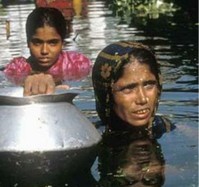Rapid change threatens foundations of human health - study
 Rapid changes already underway to the Earth’s climate, ecosystems and land cover threaten the health of billions, undermining key human life-support systems and threatening the core foundations of healthy communities worldwide, according to a new report.
Rapid changes already underway to the Earth’s climate, ecosystems and land cover threaten the health of billions, undermining key human life-support systems and threatening the core foundations of healthy communities worldwide, according to a new report. By Douglas Fischer - Daily Climate editor
The disruption represents the greatest public health challenge of the 21st century and leaves poor populations mostly in developing nations most vulnerable - even though they contribute the least to many of the problems. The report was published jointly by the Worldwatch Institute and the United Nations Foundation, two nonprofit organizations working on global policy.
“There’s been this extraordinary ballooning of the whole human enterprise,” said the report’s author, Samuel S. Myers of the Harvard University Center for the Environment, in an interview. “We’re maxing out on a lot of resources all at the same time.”
“When you put climate change on top of that, we’re looking at further destabilization of an already tenuous situation between people and their life-support systems.”
The report outlines a series of public health threats - food and water scarcity, altered distribution of infectious diseases, increased air pollution, natural disasters, and population displacement - that collectively threaten large segments of the human population. But most of the death and disability from these threats is fundamentally preventable, Myers said, if the political will can be mobilized to take strong, concerted action.
The report was released the same day developing countries said they risked “total destruction” unless the rich stepped up the fight against climate change to a level that even the United Nations says is out of reach.
The comments came from Barcelona, where the final preparatory talks are taking place before next month’s climate meeting in Copenhagen on a global treaty to replace the flawed Kyoto Protocol. Many in the international community have pegged Copenhagen as a make-or-break moment in the effort to stem greenhouse gas emissions and avert the worst impact of climate disruption, but deep divides on how to achieve necessary cuts - and compensate victims - threaten to derail those talks.

Photo: The 2009 outbreak of cholera in Zimbabwe is the worst the country has seen in many years. Photo courtesy Médecins Sans Frontieres, via flickr.
Every 30 minutes, the equivalent of a jumbo-jet full of children die from environment-related illnesses.
Keeping up pressure, the poor on Wednesday said that even the most ambitious offers on the table - by the European Union and far tougher than most nations - fell far short of what’s necessary in a new U.N. climate pact, Reuters reported.
“The result of that is to condemn developing countries to a total destruction of their livelihoods, their economies. Their land, their forests will all be destroyed. And for what purpose?” Reuters quoted Lumumba Stanislaus Di-Aping of Sudan, chair of the Group of 77 and China, representing poor nations.
Developing countries at the Barcelona talks insisted that rich nations should cut greenhouse gas emissions by at least 40 percent below 1990 levels by 2020 – far more than on offer, Reuters reported. “Anything south of 40 (percent) means that Africa’s population, Africa’s land mass is offered destruction,” Di-Aping told Reuters at a news conference.
The Worldwatch/UN Foundation report buttresses the G77’s argument. What’s needed, it concludes, is unprecedented technical and financial assistance from the international community to help developing countries adapt to the health impacts of accelerating environmental change.
“There’s a crystal-clear moral imperative here,” Myers said. “It’s pretty obvious that most of the environmental changes we’re talking about are driven by consumption and use in the developed world. Our practices are putting poor people in harm’s way.”
Many of these impacts, the report noted, are well underway. Rapid changes in climate and land use are altering the distribution of malaria, schistosomiasis and other infectious diseases. Every 30 minutes, the equivalent of a jumbo-jet full of children die from environment-related illnesses.
“This is not a prophesy of doom,” Myers said. “This is a call to action. We know how to address almost all of these actions. But almost all those things we can do to address them require technology and infrastructure….”
“It’s going to take unprecedented international effort.”
Click here for a Summary of the report
For More Information: Daily ClimateYou can return to the main Market News page, or press the Back button on your browser.

